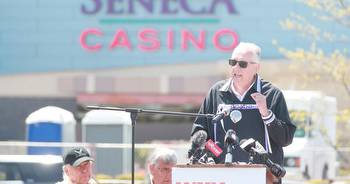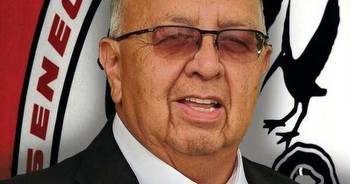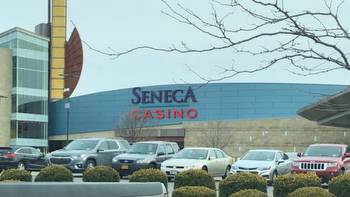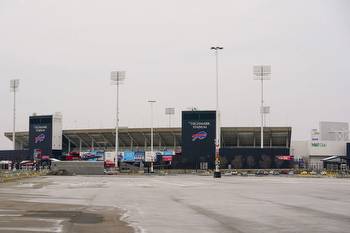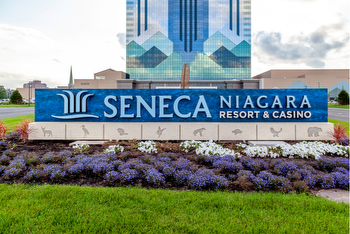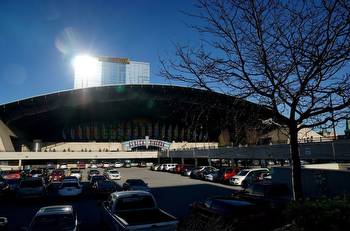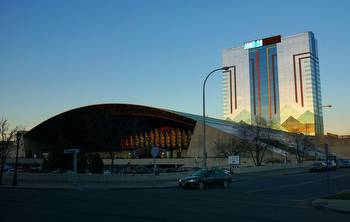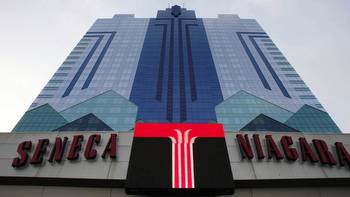Senecas change course on casino cash payments

In the face of crippling sanctions on its bank accounts and those of its gaming corporation, the Seneca Nation Council voted, in an emergency meeting Monday night, to "direct the transfer of funds to resolve the Nation’s outstanding gaming compact dispute with New York state as soon as practicable."
The council's resolution calls for transferring $564,842,625.20 from a restricted escrow account, in which compact-related funds have been held, to the state to cover the amount of shared slot revenues due for the period of Jan. 1, 2017 to Dec. 31, 2021.
Lawyers representing the state had moved on Thursday to freeze and restrict access to the bank accounts of the nation and its gaming corporation. The action had the effect of blocking the nation and gaming corporation for transacting any business.
In response to the action by the Seneca Council, the state is expected to have the restrictions placed on the bank accounts lifted.
"The accounts were unjustly targeted and frozen in an act of blatant aggression by New York state," Seneca Nation President Matthew Pagels said in a statement release Monday afternoon. "The state’s actions threatened the delivery of services, including health care and education, to the Seneca people, as well as the lives and livelihoods of thousands of Seneca and non-Seneca individuals and families across Western New York."
Pagels said the state's action left the nation with no other options but to pay the disputed shared slot revenues.
“The Seneca Nation simply could not stand by while New York state intentionally attempted to hold the Seneca people and thousands of Western New Yorkers hostage,” Pagels said. “The state may think it’s appropriate to force an elder to go without their diabetes medication or a family, already dealing with the financial impacts of the pandemic, to go without a paycheck. The Seneca Nation won’t let that happen. We will not let New York state strangle the people of Western New York.”
On March 11, the state had demanded that the nation pay the shared slot revenues by March 16. The Senecas had previously announced, on Jan. 12, that they would drop a lawsuit against the state, over the compact’s shared revenues terms, and would began making the casino cash payments that they had suspended in 2017.
However, when the state made its payment demand in March, the Senecas responded that the nation needed more time to allow the National Indian Gaming Commission to review the the current gaming compact.
That delay reportedly stemmed from internal divisions in the Seneca Nation over the resolution of the gaming pact lawsuit. A group known as the Mothers of the Seneca Nation reportedly demanded that the nation seek other remedies, including firing its lawyers or seeking an intervention from the U.S. Department of the Interior.
As part of its agreement to drop its legal challenges to the current gaming compact, Seneca Nation leaders announced that they had also entered into an agreement with the state to begin discussions on a new gaming compact. The current compact expires in 2023.
On Tuesday, Pagels issued what he called "a clear demand" for the state to immediately begin negotiations on a new casino compact.
“Don’t use the people of Western New York as pawns in your obvious desire to destroy the Seneca Nation,” he said. “You have an obligation under federal law to negotiate a compact with the Seneca Nation in good faith. Honor it.”
The current gaming compact went into effect in December 2002, granting the Seneca Nation the exclusive right to offer casino gaming in Western New York. Since then the nation has opened three casinos – Seneca Niagara Resort & Casino in Niagara Falls, Seneca Allegany Resort & Casino in Salamanca, and Seneca Buffalo Creek Casino in downtown Buffalo.
However, the nation has charged that the state has violated the current compact by allowing Video Lottery Terminals within the compact's designated exclusivity zone and by allowing online sports wagering.
"Twenty years ago, the state promised the Seneca Nation exclusivity that never truly existed and which the state has intentionally erased even further at every opportunity," Pagels said. “We are not going anywhere and we will not tolerate a governor and a state hell bent on crushing us. The time for honest compact discussions is long overdue. The Seneca Nation is ready. It’s time for New York State to come to the table."
In reaction to the Seneca Council decision, Gov. Kathy Hochul said she was pleased to resolve the dispute.
"I thank President Pagels and the Nation leadership for fulfilling their commitment to the people of New York," the governor said in a prepared statement. "Since the beginning of my administration, I have been committed to resolving this dispute and securing the funds that State and local governments are owed."
Hochul said it's her intention to direct the state's share of the funds, $418 million, toward the construction a new stadium for the Buffalo Bills.
"This will ensure the Bills remain in New York state and support 10,000 construction jobs," Hochul said. "The remainder of the funds will go directly to the counties and cities of Western New York and be reinvested to support the local economy and communities."












